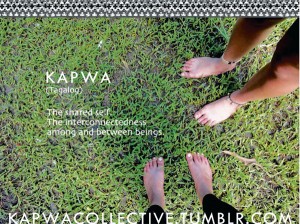Kapwa on Screen: A deeper look at Filipino culture
Kapwa on Screen: A deeper look at Filipino culture
By Dyan Ruiz
 Films screened at a community gathering encouraged the over 50 viewers to take a deeper look at Filipino culture.
Films screened at a community gathering encouraged the over 50 viewers to take a deeper look at Filipino culture.
“Kapwa on Screen” showed three short films and a feature length movie by Filipino filmmakers at the inaugural screening hosted by a group of artists, thinkers and healers called the Kapwa Collective. The screening was held at the 519 Church Street Community Centre on the evening of Jan. 19.
The screening supports the Collective’s goal to “bridge the narratives of the indigenous and the Diaspora, and the Filipino and the Canadian,” said organizer Jennifer Maramba in the introductory remarks.
The feature film of the screening was Philippine Science or PISAY. The comedic drama directed by Auraeus Solito in 2007 follows a “batch” of Filipino students through each academic year at a high school for gifted youth.
Organizer Jo SiMalaya Alcampo pegged it as the “Filipino Breakfast Club” as she introduced it to the audience, referring to the American cult classic, teen movie from the 80’s. The teen angst in the movie is distinctly Filipino. In one scene, a young man just accepted to the school on a full scholarship sits with his mother at the dinner table as she prays for her son’s future in an air-conditioned office.
The outfits, especially in the hilariously awkward dance scene, were in line with other coming of age films set in the 80’s with the patterned shirts, shoulder pads and teased bangs. But reminiscing about the decade means more to Filipinos than just bad fashion.
The early 80’s meant Martial Law under President Marcos and the People Power movement. It was a time when being rebellious against authority could lead to being arrested or disappeared, and this was clear through themes explored in the movie.
Other themes looked at clashes of lower and upper class, and art and science. While it was full of well-acted moments and creative camera shots around the campus, one thing it did lack was brevity. Then again, being brief was never a distinctly Filipino trait.
Another film screened was the 2011 short, As Told by the Butterflies, directed by Nawruz Paguidopon. The film was about the political party of lesbian, gay, bisexual, and transgender people in the Philippines called the LADLAD Party List.
The film incorporated animation and documentary footage of the party, which was founded in 2003 as the first Asian party for gay rights. The scratchy animation looked like chalk on black construction paper and conveyed the emotional thoughts of a young man struggling with his identity.
The documentary footage was from the Party List movement during the 2010 Philippine national elections. That year, the Supreme Court allowed their entry as an official party despite Church officials and the Commission on Elections (COMELEC) renouncing them for being “immoral.”
Lively and candid moments of the Party List members sparkled through the tragic thoughts of the animated character. Responding to the negativity they receive, one member dressed in an elaborate ball gown shrugged it off and said, “Karma will turn their sons and daughters gay!” This garnered the biggest laughs from the crowd that night.
Another short film screened was Suman Ladies, written and directed by Althea Balmes. The film is about women who sell the rice desserts wrapped in banana leaves on the streets of Toronto. It explored the idea of “seeing someone on the street and making a connection with them through food,” Balmes said.
Audience members, Wendy and Katherine Falcones, said they enjoyed the film, which recalled memories of people selling food outside churches in Ecuador.
They could relate to the Filipino Diaspora’s urge to connect to their culture through gatherings like this. The sisters are also “living here and missing back home,” they said.
Another audience member, Julios Sion, who is the President of the Binalona Association of Ontario said, “I can’t say it was well-organized, but it turned out well in the end,” referring to the event’s many technical difficulties. “It was tremendous for me to see young people coming back to our roots.”
The other short screened was Dreamweaver about the T’boli community. Proceeds of the screening went to the T’boli School of Living Traditions Rebuilding Initiative and Rural Missionaries Philippines and will help rebuild schools destroyed by Typhoon Pablo.

Comments (0)